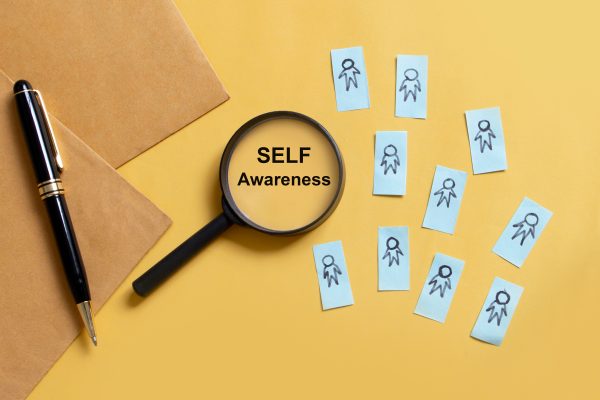Becoming a leader that inspires a team and who delivers results for an organisation requires more than just technical skills and experience.
They require one of the most critical traits for success, and that is self-awareness.
Becoming self-aware is an ongoing process that involves having a deep understanding of your own strengths, development areas, wants, needs, thoughts, emotions and values.
There is a quote by Daniel Goleman, the Psychologist and personality development PhD and best-selling author of Emotional Intelligence, that sums up why self-awareness is so critical for new leaders.
“If your emotional abilities aren’t in hand, if you don’t have self-awareness, if you are not able to manage your distressing emotions, if you can’t have empathy and have effective relationships, then no matter how smart you are, you are not going to get very far.” – Daniel Goleman.
Uncomfortable and yet a truth shared by extensive research.
As we continue our series of developing as a new leader, let’s focus on becoming self-aware.
In this post, I will explore the definition of self-awareness and its significance for new leaders and provide several practical ways to cultivate self-awareness to support your journey as a successful leader.
Definitions and Understanding Self-Awareness

As a new leader, self-awareness is your ability to truly know and understand yourself in the context of your leadership role; it helps in all areas of your life and the relationships you form too.
Imagine having an App or personal compass that helps you make sense of your thoughts, emotions and feelings, and then consequently, how you act or react and how you create the results you want.
That is what self-awareness can do for you.
Being self-aware means having an honest and objective view of yourself without being overly critical or judgmental.
You understand your strengths, areas you could improve, and your reactions in any situation.
It allows you to recognise your impact on others, identify any blind spots or biases you may have, and actively seek feedback to grow and improve.
By understanding your own emotions and triggers and how you react, you can start to change things about you that aren’t helpful and build on areas that are.
Self-awareness empowers you to lead authentically, make better decisions, and navigate challenges consistently with a level of ease and calm because you know you have the internal resources you need.
It’s a lifelong journey of self-discovery and growth, where you continuously learn from your experiences and set out a plan to become the best leader you can be.
Importance of Self-Awareness for New Leaders
As a new leader, building your self-awareness becomes even more crucial, and here are several reasons why.
Building Authentic Leadership
Self-awareness enables new leaders to lead with authenticity. By understanding their own values, beliefs, and motivations, they can align their actions and decisions accordingly. Authentic leaders are more relatable, trustworthy, and able to inspire and engage their teams.
Enhancing Emotional Intelligence

Emotional intelligence is the ability to recognise and manage emotions, both in yourself and others, as highlighted in the quote from Daniel Goleman earlier in the post. Self-awareness forms the foundation of emotional intelligence.
If you don’t have a copy of his best-seller Emotional Intelligence, head over to Amazon and get a copy; it is a classic leadership text full of gold.
By understanding your own emotions as a new leader, you can manage the thoughts that produce them as you work with your team, which will lead to stronger relationships and better results.
Effective Decision-Making
Leaders have to make decisions on a daily basis and becoming more self-aware will enhance the quality of your decision-making.
As a new leader, when you have a clear understanding of your own values, strengths and biases, you can then make decisions that align with the goals of the organisation.
Fact: Because self-aware leaders have a better understanding of self and others, an upside is they are also better equipped to manage stress and navigate challenging situations, which logically leads to more effective decision-making too.
Being Self Aware Helps You Recognise Your Blind Spots
Until you know what your blind spots are, you can’t do anything about them. No matter how good a leader you think you are, we all have blind spots. Unfortunately, as a new leader lack of awareness about our personal blind spots can hinder our decision-making which will then likely impact team dynamics and the results we are able to achieve.
Becoming more self-aware helps new leaders identify their blind spots, such as biases, communication gaps, or areas for improvement.
Promoting Self-Reflection and Growth

Self-awareness encourages self-reflection, leading to continuous personal and professional growth. New leaders who regularly reflect on their experiences, successes, and failures can learn from them and adapt their leadership approach.
I have touched on only a small number of the upsides of becoming more aware of ourselves and how we react.
So now, let’s look at a few practical ways to start cultivating your own awareness.
Ask For Coaching and Feedback

Depending on your organisation, you may or may not have access to coaching through your line manager or mentor.
If you don’t know if you have, then ask and request coaching. Anyone that wants to improve or excel at what they do has a coach. As a leadership coach and trainer, I still continue to have coaching and always will because I experience its many benefits.
A coach can help you question the conversation you are having with yourself, especially as you navigate working with your habit brain that will often attempt to run your thoughts and actions unchecked. I have written several posts about thought management that you will find here.
In addition, actively seek feedback from peers, mentors and team members. Create a safe and open environment where others feel comfortable providing honest feedback about your strengths and areas for improvement.
Utilise self-assessment tools, such as personality assessments or leadership style inventories, to gain insights into your natural tendencies and preferences. These assessments can provide valuable information about your strengths and areas for development, helping you understand yourself better as a leader.
If you want more support in this area, have a look at our various leadership development programmes that can help here.
Read Journal and Learn
Becoming more self-aware starts with you and setting yourself up for success in the best way possible. Three areas that will help enormously with this involve reading, learning and reflecting through journaling.
Embrace a mindset of continuous learning and growth. Actively seek new experiences, challenges, projects and opportunities that push you outside your comfort zone. Embrace failure as a chance to learn and improve. Engage in professional development activities, such as workshops, seminars or coaching, to expand your knowledge and skills.
Set yourself goals related to what you want to learn and master this year.
Write a journal to record your thoughts, reflections and insights regularly. Writing allows you to process your experiences, emotions and challenges.
Reviewing your journal entries can help identify patterns, triggers and areas where you want to improve.
Journaling is one of the most powerful tools for self-reflection and self-discovery.
Finally
Becoming self-aware as a new leader is a transformative journey. By understanding yourself, recognising what you are good at and where you need to improve and being aware of your impact on others, you can lead with authenticity and make better decisions.
Use all the suggestions in this post and seek out others that work for you.
Remember, self-awareness is an ongoing practice, and by dedicating time and effort to it, you can become a more effective and impactful leader.
Until next time,
Julia Carter
About Zestfor
Zestfor delivers training coaching and development programs and resources scientifically tailored to develop leaders and their teams in technical markets – including Pharmaceutical, I.T., and Life Sciences.
Our blend of in-classroom, online, and virtual live-stream delivery methods will engage and assure even the most introverted team members from the first meeting.
You can find out more about our new Raising Resilience programmes here. Or call us on 0845 548 0833.










